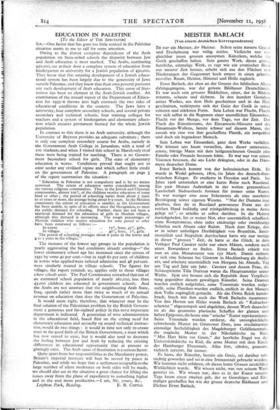EDUCATION IN PALESTINE, [To the Editor of THE SPECTATOR] SIR, — One
factor that has gone too little noticed in the Palestine
. situation seems to me to call for some attention.
Owing to the almost complete dependence of the Arab population on State-aided schools the disparity between Jew and Arab education is most marked. The Arabs, numbering 950,000, see at their door a complete system of education from .kindergarten to university for a Jewish population of 430,000. They know that this amazing development of a Jewish educa- tional system has been largely due to the generosity of Jews outside Palestine, and they know that their own poverty prevents any such development of Arab education. This sense of frus- tration has been an element in the Arab-Jewish conflict. An examination of the annual report of the Department of Educa- tion for 1935-6 throws into high contrasts the two sides of
educational conditions in the country. The Jews have a university, four complete secondary schools, and several private secondary and technical schools, four training colleges for teachers and a system of kindergarten and elementary educa- tion which ensures permanent literacy for the whole Jewish "population.
In contrast to this there is no Arab university, although the University of Beyrout provides an adequate substitute ; there is only one complete secondary course for Arabs, namely in the Government Arab College in Jerusalem, with a total of zoo students, and when I visited this school in March only to of these were being trained for teaching. There is no Govern- ment Secondary school for girls. The state of elementary education is worse. Conditions prevail that ought not to exist under any civilised regime and which reflect little credit on the government of Palestine. A paragraph on page 3 of the report summarises the situation :
"Education in Palestine is not compulsory and is by no means universal. The extent of education varies considerably among the various religious communities. Thus, in the Jewish and Christian communities, almost t00% of the children receive education of some kind or other ; the period of schooling varies from about 5 years to to years or more, the average being about 8-9 years. In the Moslem community the extent of education is smaller, as the Government has been unable, in spite of its efforts since the Occupation, to meet the public demand for schooling. Further, there has not been a universal demand for the education of girls in Moslem villages, although this demand is increasing. The rough percentages of Moslem children who receive education for some period or other have been estimated as follows • In towns .. • ; 75% boys, 45% girls) In villages . 40% boys' "Y. girls. The period of schooling averages about_ 6 years in the towns and 4 to 5 years in the villages."
The increase of the lowest age groups in the population is yearly aggravating the bad conditions already existing—" the lower elementary school age has increased since the census of 1931 by some 40 per cent.—but in 1936 62 per cent. of children in towns who applied were refused admission and 48 percent. were similarly treated in village schools. The figures for villages, the report reminds us, applies only to those villages where schools exist. The Peel Commission remarked that out of an estimated school population of nearly 261,000, less than 43,000 children are educated in government schools. And the Arabs are not unaware that the neighbouring Arab State, Iraq, spends rather more than twice as much of its annual revenue on education than does the Government of Palestine.
It would seem right, therefore, that whatever may be the final solution of the Palestinian problem by the British Govern- ment a generous and far-sighted policy in this most important department is indicated. A generation of wise administration in the educational field, based first on the crying need for elementary education and secondly on sound technical instruc- tion, would do two things : it would in time not only re-create trust in the good faith of the British Government, a trust which has now ceased to exist, but it would also tend to decrease the feeling between Jew and Arab by reducing the existing differences in educational opportunity that at present so glaringly exist. The Arab sense of frustration is a serious factor.
Quite apart from her responsibilities as the Mandatory power, Britain's imperial interests will best be served by peace in Palestine, and while we hope that a settlement acceptable to the large number of silent moderates on both sides will be made, we should also see in the situation a great chance for lifting the issues away from the plane of expediency to something higher and in the end more productive.—I am, Sir, yours, &c.,










































 Previous page
Previous page